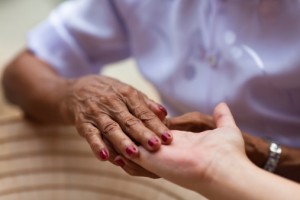By Kathy Kuhn, Center for Aging and Disability Resource (CADER), BU School of Social Work
I’d like to share with you a story from my days as a social worker at Kit Clark Senior Services (KCSS).
Ms. McKay is an 82-year-old African American woman living in Dorchester. She was single, with significant hypertension, diabetes, and arthritis. Although she had a prosthetic leg, she was mobile. She had been active in her church but was recently spending more and more time alone in her apartment and not even collecting her mail. Her apartment was getting increasingly cluttered, bordering on hoarding.
 The resident services coordinator (RSC) of her senior building noticed that Ms. McKay seemed depressed, and offered several suggestions. First, he recommended that she see her primary care physician. She said that she had two weeks prior, was told that she looked okay, and to return in six months. The RSC then suggested the local hospital’s outpatient psychiatric clinic for mental health treatment, but Ms. McKay did not feel she had the ability to handle that. Finally, Ms. McKay agreed to see a social worker from KCSS (me) in her home.
The resident services coordinator (RSC) of her senior building noticed that Ms. McKay seemed depressed, and offered several suggestions. First, he recommended that she see her primary care physician. She said that she had two weeks prior, was told that she looked okay, and to return in six months. The RSC then suggested the local hospital’s outpatient psychiatric clinic for mental health treatment, but Ms. McKay did not feel she had the ability to handle that. Finally, Ms. McKay agreed to see a social worker from KCSS (me) in her home.
Ms. McKay is typical of older adults with mental health concerns in that she was not self-referred, and that going to a large mental health clinic would just be too difficult a first step. Through home visiting, I felt I could address the stigma related to depression and treatment. We talked about how her only close relative, her niece, moved away. She spoke about the loss of her leg in an accident that also precipitated the break-up of her engagement in her 20s. She never married and had never talked about her sadness from this. We talked extensively about how she felt that no one really cared whether she showed up or not. This lack of belonging, the fact that she felt no one cared or maybe would not even know if she disappeared, is a significant risk factor for suicide.
Through regular weekly visits, always being on time, addressing her suicidality, and acknowledging her losses and grief, Ms. McKay began to feel better. Over time, she agreed to come to KCSS to see me at the clinic, have lunch at the senior center, and join the quilting class. She was able to resume going to church and the women in her quilting class took a real interest in her. I continued to see her monthly.
Ms. McKay had a good outcome, but many older adults with mental health issues are not getting the treatment they need.
Research from the Massachusetts Healthy Aging Data Report showed that more than a quarter (29%) of Massachusetts residents 65 or older have been diagnosed with depression, and only a small percentage of those with depression receive treatment for it. Also concerning is the fact that suicide rates are among the highest for Americans aged 65 and older and are almost three times the homicide rate. The main cause? Untreated depression. As our population grows older, the problem of suicide among older adults will increase exponentially if no action is taken.
A major barrier to getting mental health treatment is the failure of health providers to recognize mental health issues. Many primary care health providers lack adequate training in both mental health and geriatrics. Evidence shows that when primary care providers screen for depression, the number of people identified as depressed doubles. Providers should solicit and act upon this information, since nearly 70 percent of older adults who have completed suicide visited their primary care physician within the month of their death.
Older adults may also not seek mental health treatment due to stereotypical beliefs about aging. Many older adults believe that depression is just part of aging. They can feel personally responsible for their emotional state with a strong sense of shame. “It’s my fault and I need to just get over it,” is something I would often encounter.
With training, providers can learn how to screen for mental health issues in older adults, and anticipate and respond effectively to the barriers of getting mental health treatment. Training for those in health settings to screen and refer for treatment could have a major impact on mental well-being for older adults like Ms. McKay.
I am passionate about training. I left KCSS to work at the Boston University School of Social Work creating online training programs for people working with older adults and those with disabilities. In my next blog post, I’ll share some best practices for identifying and addressing mental health issues.
For now, you can learn more about research and training in geriatric social work from CADER’s publications.
You can also view additional resources on mental health in the Resource Library.
